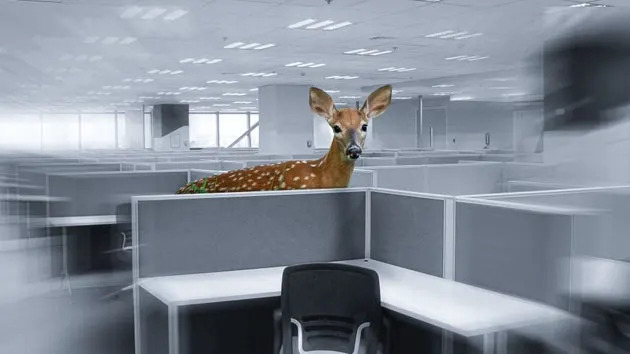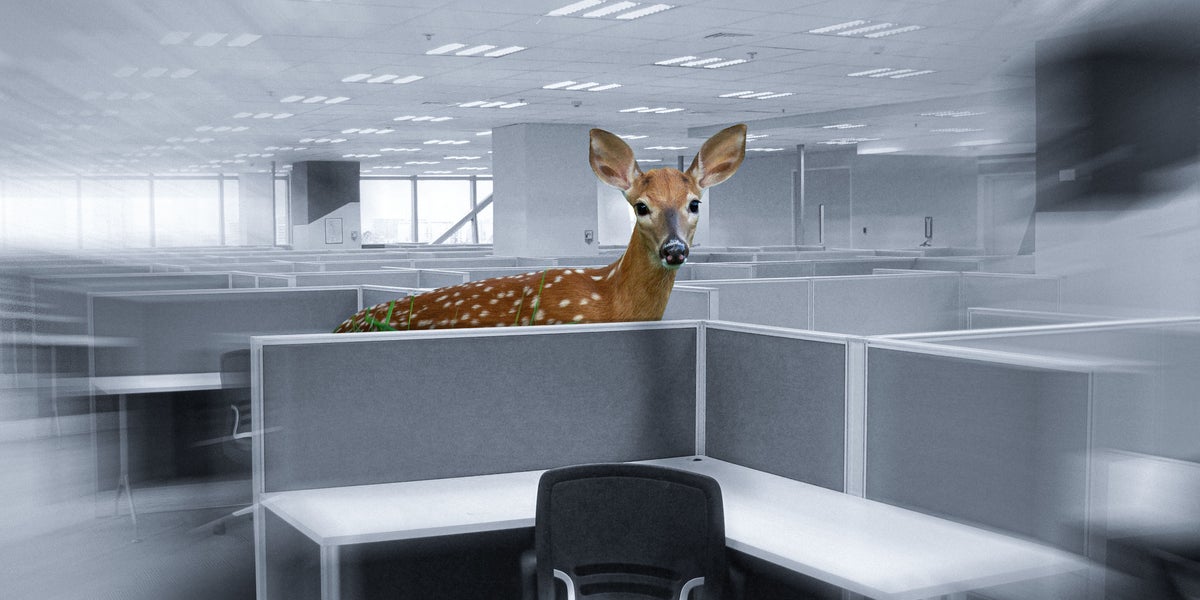If your job is constantly worrying you or stressing you out, you might start “fawning,” a self-defense mechanism that people unknowingly engage in at work.
Like fawns that are in constant danger from predators, people who fawn will posture submission and become overly deferential and agreeable to the needs of others in order to protect themselves from perceived threats. For many of us at work, that threat is usually a boss.
“People typically fawn because it feels like the safest option to them, especially if they are in a setting or relationship where they have less power,” said Lauren Appio, a psychologist and executive coach. “And who has more power over the quality of your life than someone who has the power to hire or fire you?”
This fawning stress response can be born from a fear of living in tense homes with unpredictable authority figures, said Meg Josephson, a psychotherapist who is the author of a new book “Are You Mad At Me?” which unpacks why people fawn.
Related: You Might Be ‘Masking’ Without Realizing It — And It Could Be Burning You Out
“What I’ve witnessed in my clinical work and certainly within myself as well, is that as we grow up, that fear of authority changes forms and manifests in the workplace with bosses and colleagues,” Josephson said. “So this feeling of, ‘Am I in trouble?’ or ‘Are they mad at me?’ pops up, and it’s often a similar experience to how we may have felt growing up, if we were in an environment where we had to always be ‘good’ or ‘perfect.’”
What Fawning Looks Like At Work And How It Holds You Back 
Fawning can be a lifelong habit that can take time to unlearn, so be kind to yourself if you find these self-protective patterns relatable. Illustration: HuffPost
Fawning “is an extreme form of people-pleasing behavior,” said Adjoa Osei, a licensed clinical psychologist. Osei said under this coping strategy, professionals often have trouble saying no and with setting boundaries, and are likely to take on excessive work as a way to avoid rejection and conflict with others.
Fawning can also become a common self-defense strategy in toxic workplaces with unreasonable co-workers. And it often means pretending to be someone you’re not.
“If you have a moody, irritable boss, you may learn to fawn and appease them to avoid their anger. If members of your team are gossipy and exclusionary, you may go along with their toxic behavior to avoid being a target,” Appio said. “Or, if your workplace seems to prioritize loyalty and punish dissent, you may fawn to stay in people’s good graces and ultimately keep your job.”
Appio noted that there are two types of fawners: Ones who know they are people-pleasing to survive corporate America and ones who don’t even realize what they are doing.
“In one case, the person fawning is aware of their preferences, feelings or needs, and consciously overriding those things to maintain harmony and their own security,” she explained. “In the other, the person fawning struggles to differentiate their own feelings or needs from others. They might not actually know their own preferences. These folks tend to have been exposed more frequently to highly controlling people or environments.”
Not all fawning is bad. “It’s a brilliant unconscious safety mechanism and sometimes, it’s really helpful and necessary,” Josephson said. “Many fawners are highly successful because of their ability to please, adapt and hold themselves to a standard of perfection.”
But if you do this too much, you will not be successful in your career for long. It can make you appear more junior than you actually are to follow other people’s ideas instead of voicing and defending your own.
“You might develop a reputation for being good at executing other people’s ideas, but not necessarily contributing your own,” Appio said. “So you might find yourself being overlooked for management roles or promotions.”
Making yourself say “yes” when you know it’s healthier to say “no” will also put you on the fast-track for burnout. “You may find yourself disregarding your own limits, overworking and having your contributions overlooked at the same time, which can make us feel worthless or deeply resentful,” Appio said.
It’s also taxing to constantly be working with this fear festering in your gut.
“The fawn response can also manifest as this constant feeling that you’re about to get in trouble, feeling like you’re going to get fired whenever your boss says ‘Can we chat?’, worrying that your colleague is mad at you because they sent you a one-word response,” Josephson said.
What To Do If You’re A Fawner
Fawning can be a lifelong habit that can take time to unlearn, so be kind to yourself if you find these people-pleasing behaviors and self-protective patterns relatable. First start by recognizing “how this has kept you safe,” and release any shame or judgment, Josephson said.
Related: 5 Work Habits That Are Secretly Depression In Disguise
Once you accept where you are, you can begin to heal from the survival strategies that no longer serve you as a working adult. Here’s how.
Take time to listen to your moods.
Fawning is often an unconscious survival strategy to survive, so learning to recognize when it’s happening is one of the first ways you can undo this pattern.
Notice “the thoughts, feelings or body sensations you have when you disagree with someone or feel pulled to please,” Appio suggested. “Really getting to know these initial cues will help you shift out of a fawning pattern.”
Don’t make someone else’s emergency your own.
Taking a few seconds to pause before reacting to your manager’s latest wild demand can help weaken your immediate impulse to fawn.
“Practice inserting a pause before reacting, slow down and take a moment to release any urgency, take a few deep breaths before responding,” Josephson said. “Even if you do this for two seconds, you’re already beginning to break the pattern.”
Practice saying no to your trusted friends and peers.
Saying “no” may seem too scary at first, so start by voicing your true opinions to people you trust.
“Look for lower-stakes opportunities to express a dissenting opinion ― maybe starting with a trusted peer, or expressing a preference for where to order from lunch,” Appio said.
Write down your values so you don’t forget.
Fawning can make your forget who you are, so do a gut check with yourself about why your opinions matter.
Ask yourself: “Do you want people to agree with you just to keep the peace? Do you want people to defer to you so you won’t be upset? Or would you rather know how other people feel, even if it is challenging or inconvenient? Let your values guide your choices. If it’s OK for others to express their needs, it’s also OK for you,” Appio said.
“Remind yourself that in healthy environments, people want you to be honest. They will value your ideas, feedback and assertiveness,” she continued.
Doing these tips will take time and work, but it will help you transform back from a helpless fawn into a human adult that feels empowered in their own career. And that’s a power you can carry with you, no matter which kind of wild animals you encounter as bosses or co-workers in your careers.
Related…

